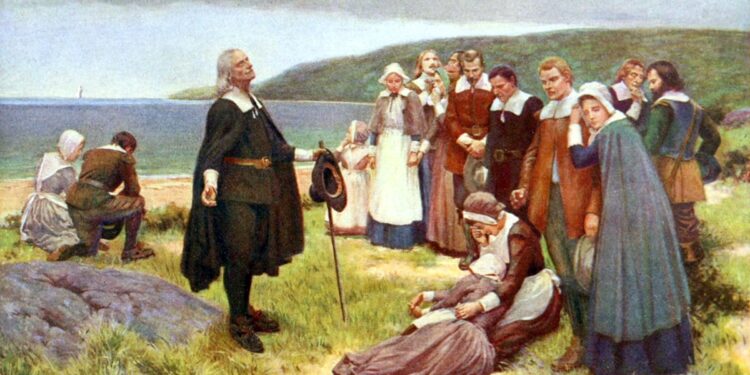What role did Puritanism play in early American literature
How did puritanism affect early American literature?, What impact did the Puritans have on early America?, What was the role of puritanism?,Puritanism exerted a significant and multifaceted influence on the early American literary landscape, leaving an enduring imprint on its themes, forms, and underlying ideologies. Emerging in the 17th century, Puritanism was characterized by its fervent commitment to Protestant Christianity and its strict interpretation of biblical doctrine. As Puritan settlers sought religious freedom in the New World, their beliefs profoundly shaped the literature of the era, infusing it with themes such as the tension between divine grace and human depravity, the conflict between individual conscience and societal norms, and a didactic emphasis on moral instruction.What role did Puritanism play in early American literature
Central to Puritan theology was the concept of predestination, which instilled a profound sense of existential angst and the quest for spiritual assurance among writers of the time. This theological framework is vividly depicted in Jonathan Edwards’s renowned sermon “Sinners in the Hands of an Angry God,” which portrays the terrifying consequences of damnation, reflecting the Puritan preoccupation with salvation and the consequences of sin. Furthermore, the tension between individual autonomy and communal expectations within Puritan society often found expression in literature. Nathaniel Hawthorne’s “The Scarlet Letter,” for instance, explores the clash between personal integrity and societal judgment, echoing Puritan concerns about the individual’s role within the community.What role did Puritanism play in early AmerWhat role did Puritanism play in early American literatureican literature
Also Read-
- Contemporary American Literature since 1945 : Themes, Movements, and Influential Authors
- Sinclair Lewis as a greatest poet in American literature
- What was American literature like in the 1950s
Puritan literature also served as a vehicle for moral instruction and spiritual guidance, employing allegory, symbolism, and accessible language to convey religious truths. John Bunyan’s “The Pilgrim’s Progress” is a prime example, offering moral and spiritual insights through the allegorical journey of its protagonist, Christian. Moreover, Puritan writings contributed to the construction of American identity and the mythos of the New World, portraying America as a divinely ordained land of opportunity and destiny. Mary Rowlandson’s captivity narrative, for instance, recounts personal hardship within a providential narrative of divine judgment and deliverance, reinforcing the notion of American exceptionalism.What role did Puritanism play in early American literature
Despite the prevailing orthodoxy of Puritanism, dissenting voices emerged within the community, challenging established beliefs and authorities. Anne Bradstreet’s poetry, for example, subverted traditional gender roles and expressed personal emotions, showcasing a departure from Puritan norms while still engaging with its themes. Furthermore, Puritan literature laid the groundwork for distinctly American literary forms and genres, adapting traditional forms such as sermons and captivity narratives to convey religious experiences in the New World.
Conclusion
Puritanism exerted a profound and lasting influence on early American literature, shaping its themes, forms, and underlying ideologies. Through theological reflections, moral instruction, and cultural narratives, Puritan writers navigated the complexities of faith, morality, and identity in the New World.
Their works explored existential anxieties, societal tensions, and the pursuit of salvation, reflecting the enduring impact of Puritanism on American literary tradition. Despite the passage of centuries, the legacy of Puritanism continues to resonate in the literature of the United States, serving as a testament to the enduring power of religious faith, moral conviction, and cultural heritage.
FAQ:
1. What is Puritanism?
Puritanism was a religious and cultural movement that emerged in the 17th century, characterized by a fervent commitment to Protestant Christianity and a strict interpretation of biblical doctrine. Puritans sought to reform the Church of England and adhere to a purer form of worship based on Scripture.
2. How did Puritanism influence early American literature?
Puritanism influenced early American literature in numerous ways. It shaped themes such as the tension between divine grace and human depravity, the struggle between individual conscience and societal norms, and the pursuit of moral instruction and spiritual guidance. Puritan writers adapted traditional literary forms to convey their religious beliefs and experiences in the New World, laying the groundwork for distinctly American genres and narratives.
3. What are some examples of Puritan literature?
Prominent examples of Puritan literature include sermons, diaries, captivity narratives, and allegorical works. Jonathan Edwards’s sermon “Sinners in the Hands of an Angry God,” Mary Rowlandson’s “Narrative of the Captivity and Restoration,” and John Bunyan’s “The Pilgrim’s Progress” are among the most well-known works of Puritan literature.
4. How did Puritanism contribute to the construction of American identity?
Puritanism contributed to the construction of American identity by portraying America as a divinely ordained land of opportunity and destiny. Puritan narratives often depicted the New World as a refuge for religious freedom and a beacon of divine providence, reinforcing notions of American exceptionalism and the pioneering spirit.
5. Why is the legacy of Puritanism important in American literature?
The legacy of Puritanism is important in American literature because it reflects the enduring influence of religious faith, moral conviction, and cultural heritage in shaping the literary tradition of the United States. Puritan writers grappled with timeless themes and existential questions that continue to resonate with readers today, making their works a vital part of the American literary canon.













